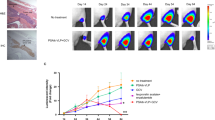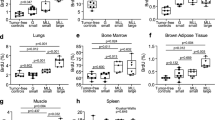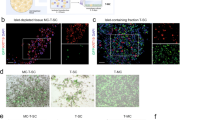Abstract
The activity and expression of transgene β-galactosidase (lacZ) by replication-deficient adenoviral vectors (Ad-lacZ) containing prostate-specific promoters were compared using an in vivo canine model. The prostate tissue-specific promoters were prostate-specific antigen, probasin, and mouse mammary tumor virus long-terminal repeat, which were fused separately to an Escherichia coli lacZ gene. Dogs underwent laparotomy, and adenoviral vectors were delivered by direct intraprostatic injection. At 72 hours postinjection, the prostate and various other organs were harvested to evaluate the degree of prostate expression and dissemination of adenoviral vectors. Expression of lacZ in tissues was determined by 5-bromo-4-chloro-3-indolyl β-D-galactoside staining, β-galactosidase assay, and E. coli lacZ reverse transcriptase-polymerase chain reaction (PCR). The presence of adenoviral DNA sequences in canine tissues was determined by PCR using primers specific for the type 5 adenoviral genome. All three of the prostate-specific adenoviruses tested effectively expressed the lacZ gene in the canine prostate, but expression levels were lower than that of the control viral vector AdRSVlacZ following intraprostatic injection. By PCR, adenoviral vector DNA was detected in other organs and tissues, including the bladder and vas deferens. However, reverse transcriptase-PCR analysis revealed that prostate-specific Ad-lacZ vectors only transcribed lacZ mRNA in the prostate and not in nonprostatic tissues. Thus, these novel prostate-specific adenoviral vectors each have equal in vivo expression exclusively in the prostate and may potentially be used for prostate cancer gene therapy.
This is a preview of subscription content, access via your institution
Access options
Subscribe to this journal
Receive 12 print issues and online access
$259.00 per year
only $21.58 per issue
Buy this article
- Purchase on Springer Link
- Instant access to full article PDF
Prices may be subject to local taxes which are calculated during checkout
Similar content being viewed by others
Author information
Authors and Affiliations
Corresponding author
Rights and permissions
About this article
Cite this article
Steiner, M., Zhang, Y., Carraher, J. et al. In vivo expression of prostate-specific adenoviral vectors in a canine model. Cancer Gene Ther 6, 456–464 (1999). https://doi.org/10.1038/sj.cgt.7700065
Received:
Accepted:
Published:
Issue Date:
DOI: https://doi.org/10.1038/sj.cgt.7700065
Keywords
This article is cited by
-
Regulation of transgene expression in muscles by ultrasound-mediated hyperthermia
Gene Therapy (2004)
-
In vivo characterization of a prostate-specific antigen promoter-based suicide gene therapy for the treatment of benign prostatic hyperplasia
Gene Therapy (2003)
-
Creation of a new transgene cloning site near the right ITR of Ad5 results in reduced enhancer interference with tissue-specific and regulatable promoters
Gene Therapy (2001)
-
Chimeric PSA enhancers exhibit augmented activity in prostate cancer gene therapy vectors
Gene Therapy (2001)
-
p16/MTS1/INK4A suppresses prostate cancer by both pRb dependent and independent pathways
Oncogene (2000)



